In our modern digital era, information is readily accessible. However, with the vast expanse of the internet, finding what we need can be daunting. Enter search engines, the indispensable tools that streamline our online exploration by sifting through billions of web pages to uncover relevant information.
The realm of search engines is in constant flux! Brace yourself, for 2023 witnessed significant advancements. Search engine algorithms became more sophisticated, artificial intelligence integration deepened, and user interaction with search engines became smoother than ever.
Understanding the mechanics behind these search engines isn't merely trivia for tech enthusiasts; it's vital for anyone seeking online visibility for their website. This comprehensive guide delves into the top 7 search engines dominating the digital landscape. We'll dissect their distinct features, as well as the latest AI enhancements revolutionizing the search experience.
Furthermore, we provide curated links to top-notch resources, equipping you with winning strategies not only to reach your target audience but potentially convert them into paying customers. Let's delve into harnessing the immense power of search engines in today's digital terrain! Whether you're embarking on a Digital Marketing Course or simply navigating the online realm, understanding search engine dynamics across various browsers is paramount.
Here, we'll explore the world's most renowned search engines, analyzing their market shares, unique attributes, and the pros and cons of each:
- Google:
Market Share: Google maintains its dominance, commanding over 81.74% of the search market.
Background: Founded in 1996 by Sergey Brin and Larry Page, Google has become synonymous with online search.
Pros & Cons:
Pros: Massive potential traffic, influence over other engines, and feature-rich SERPs.
Cons: Stiff competition, costly paid search, and evolving AI-driven experiences.
- Microsoft Bing:
Market Share: Bing holds a notable share, particularly in specific regions.
Features: Visual search, rewards program, and seamless integration with Microsoft products.
Pros & Cons:
Pros: Diverse user base, robust image and voice search capabilities.
Cons: Limited market share compared to Google.
- Yahoo! Search:
Market Share: Yahoo! maintains relevance but with a smaller market share.
Legacy: Once dominant, Yahoo! now relies on partnerships with other search engines.
Pros & Cons:
Pros: Rich in news and entertainment content, Yahoo! Answers platform.
Cons: Limited market share, diminished focus on innovation.
- DuckDuckGo:
Market Share: A privacy-oriented search engine gaining traction.
Privacy Features: No tracking, absence of personalized ads, and encrypted connections.
Pros & Cons:
Pros: Privacy-centric approach, intuitive interface.
Cons: Limited index size, fewer features.
- Baidu:
Market Share: Dominant in China.
Features: Chinese language search, news, maps, and more.
Pros & Cons:
Pros: Access to the vast Chinese market, diverse multimedia content.
Cons: Limited global reach, language barrier for non-Chinese users.
- Yandex:
Market Share: Popular in Russia and neighboring regions.
Services: Search, maps, email, and cloud storage.
Pros & Cons:
Pros: Localization for tailored results, Yandex.Direct advertising platform.
Cons: Limited influence beyond its regional boundaries.
- Ask.com:
Market Share: Smaller but still significant.
Q&A Focus: Known for its question-and-answer format.
Pros & Cons:
Pros: Direct answers, fostering community engagement.
Cons: Limited market share, less comprehensive search capabilities.
In this dynamic digital landscape, comprehending the strengths and weaknesses of each search engine is paramount. Whether you're a marketer optimizing for Google or a privacy-conscious user exploring DuckDuckGo, these engines shape our online interactions. Remember, the world of search is ever-evolving, and staying abreast ensures effective navigation through the vast expanse of information available online.




Comments
Post a Comment